

Overfishing - A global environmental problem, threat to our oceans and disaster. What is Water Pollution for children. What is water pollution?
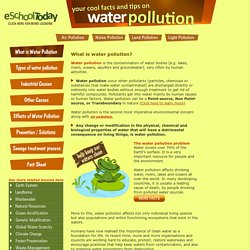
Water pollution is the contamination of water bodies (e.g. lakes, rivers, oceans, aquifers and groundwater), very often by human activities. Water pollution occur when pollutants (particles, chemicals or substances that make water contaminated) are discharged directly or indirectly into water bodies without enough treatment to get rid of harmful compounds. Pollutants get into water mainly by human causes or human factors. Water pollution can be a Point-source, Non Point-source, or Transboundary in nature (Click here to learn more). Water pollution is the second most imperative environmental concern along with air pollution. Environmental Health Student Portal. Water: State of the Earth. Oceans, Whales & Seafood. Help protect marine life. Half the oxygen we breathe comes from our oceans.
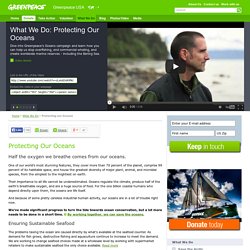
One of our world’s most stunning features, they cover more than 70 percent of the planet, comprise 99 percent of its habitable space, and house the greatest diversity of major plant, animal, and microbial species, from the simplest to the mightiest on earth. Their importance to all life cannot be underestimated. Oceans regulate the climate, produce half of the earth’s breathable oxygen, and are a huge source of food. For the one billion coastal humans who depend directly upon them, the oceans are life itself. And because of some pretty careless industrial human activity, our oceans are in a lot of trouble right now. We’ve made significant progress to turn the tide towards ocean conservation, but a lot more needs to be done in a short time.
Ensuring Sustainable Seafood. Marine Protected Areas & Ocean Pollution Facts. Marine debris is everyone's problem. Marine problems: Pollution. Seas of garbage Solid garbage also makes its way to the ocean.
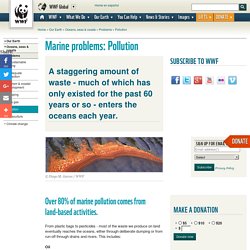
The Dirty Truth About Plastic. BPA, in turn, is becoming this year’s poster child for all our doubts and fears about the safety of plastic.
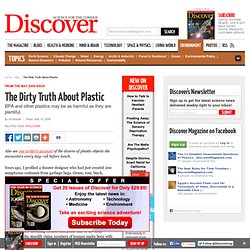
New research highlighting the possible dangers of BPA has received tremendous media coverage. In mice, at least, BPA exposure at crucial stages of development induces observable changes (such as breast or prostate abnormalities) that last a lifetime. The research may be confusing to a layperson, yet some consensus has been reached: Last November a panel sponsored by the National Institutes of Health (NIH) determined that there was at least “some concern” about BPA’s effect on the fetal and infant brain.
Around the same time, the Centers for Disease Control reported that researchers there had found BPA—the United States produces 6 billion pounds of it yearly—in 93 percent of urine samples from 2,500 Americans aged 6 to 85. Children under age 12 had the highest concentrations. Chemicals like BPA pose a challenge for conventional toxicology, vom Saal says. Plastic Plague. National Geographic. Ocean overfishing is simply the taking of wildlife from the sea at rates too high for fished species to replace themselves.
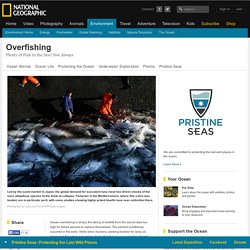
The earliest overfishing occurred in the early 1800s when humans, seeking blubber for lamp oil, decimated the whale population. Some fish that we eat, including Atlantic cod and herring and California's sardines, were also harvested to the brink of extinction by the mid-1900s. Highly disruptive to the food chain, these isolated, regional depletions became global and catastrophic by the late 20th century. When It Started Marine scientists know when widespread overfishing of the seas began. In the mid-20th century, international efforts to increase the availability and affordability of protein-rich foods led to concerted government efforts to increase fishing capacity. But by 1989, when about 90 million tons (metric tons) of catch were taken from the ocean, the industry had hit its high-water mark, and yields have declined or stagnated ever since.
When It Will End. Why is overfishing a global concern? The problem of Overfishing We all love to eat fish, don’t we?
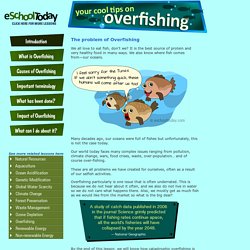
It is the best source of protein and very healthy food in many ways. We also know where fish comes from—our oceans. Marine Fisheries & Aquaculture Series: Empty Oceans, Empty Nets – Overview. Understanding overfishing. UC Davis School of Vet Med: Oiled Wildlife Care Network: What Happens During an Oil Spill. Recovery and Transportation - When there is an oil spill, specially trained workers go out and collect oiled wildlife.
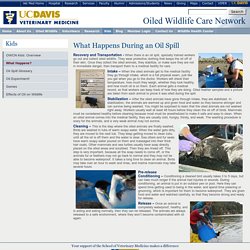
They wear protective clothing that keeps the oil off of their skin. Once they collect the oiled animals, they stabilize, or make sure they are not in immediate danger, then transport them to a medical facility for care. Intake – When the oiled animals get to the medical facility they go through intake, which is a full physical exam, just like you get when you go to the doctor. Workers will check their temperature, how much they weigh, whether they look healthy, and how much oil is on them.
Each animal gets a medical record, so that workers can keep track of how they are doing. Stabilization – After the oiled animals have gone through intake, they are stabilized. Cleaning – This is the step where the oiled animals are finally washed. Release – Once an animal is completely waterproof, healthy, and is acting and eating normally, then they can be released.